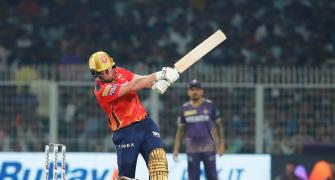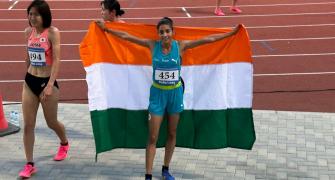Won by Greek Spiridon Louis the first Olympic marathon in 1896, raced over roughly 40 kms from Marathon in Attica to Athens, was the brainchild of French linguist and historian Michel Breal.
It was inspired by the tale of Philippides, who was said to have run from the plain of Marathon to Athens in 490 BC to convey the news that the Athenians had defeated the Persians.
"Be joyful, we win," Philippides was reported to have gasped before dropping dead of exhaustion.
One problem with a story inspired by the first land victory by Athens over Persia is that Greek historian Herodotus, writing some 60 years later, makes no reference to the epic run.
Instead, Herodotus records that before the battle Philippides made an even more impressive 240-km round trip from Athens to Sparta and back over two days to ask the Spartans, in vain, for assistance.
But myth is more potent than reality and at the 1896 Games and again at the 1904 Paris Olympics the race length remained approximately the distance from Marathon to Athens.
Then in 1908 London organisers set a course of 41.6 kms from Windsor Castle to the Olympic stadium, adding 385 metres around the track to enable the race to finish directly under the royal box of Queen Alexandra. The imperial distance, equivalent to 42.195 kms, became the official length.
LOUIS TRIUMPH
In 1896, 18 runners lined up in Marathon for the Olympic event. Louis emerged first from the dust and the heat into the Olympic stadium.
The two Greek princes, George and Constantine, rushed down to greet their new hero, who clocked two hours 58 minutes 50 seconds.
Louis's origins remain shrouded in mystery. He has been variously reported to have earned his livelihood as a shepherd, a professional water carrier or a postman in his Attica village of Maroussi.
Deluged with offers of lavish gifts from Athens merchants, the modest Louis rejected free shaves, wine and clothing for life plus a shotgun. All he wanted was a horse and cart.
In the 1904 St Louis race, held in searing heat, New Yorker Fred Lorz reached the stadium first. He was acclaimed the winner and photographed with Alice Roosevelt, daughter of United States president Theodore.
When it emerged that Lorz had hitched a ride for about a quarter of the race another American, Thomas Hicks, was awarded
PIETRI COLLAPSES
Four years later bodily assistance given to Italian Dorando Pietri proved impossible to ignore. Pietri collapsed in the stadium and was helped across the line by British officials. An American protest resulted in the race being awarded to John Hayes.
Pietri became more famous for failure than he would have been for success, turning professional and becoming the unwitting subject of one of Irving Berlin's more forgettable compositions: "Dorando, He'sa Gooda for Not."
At the 1936 Berlin Olympics, the final Games before World War Two, politics were inextricably interwoven with sport.
Korean Sohn Kee-chung set a world best running for Japan, who had occupied his homeland. During the victory ceremony, celebrated by the raising of the Japanese flag, he and third-placed team mate Nam Seung-yong hung their heads in silent protest.
Another victim of 20th century politics, Czech Emil Zatopek, completed a unique treble by winning the marathon at the 1952 Helsinki Games after finishing first in the 5,000 and 10,000 metres.
Zatopek, who revolutionised distance running with his punishing training sessions, fell foul of the authorities after Soviet troops crushed the 1968 Prague spring reform movement. He was expelled from the army and the Communist Party.
Perhaps the greatest of all was the slight Ethiopian Abebe Bikila, the first black African to win an Olympic title.
Running barefoot through a hot evening along the Appian Way at the 1960 Rome Games, Bikila won by more than half a minute in a world best. In Tokyo four years later, this time wearing shoes, he set another world best, warming down with a series of brisk exercises afterwards while he waited for the remainder of the field to reach the stadium.
Female runners, thought for most of the century to be too frail to cover anything longer than 800 metres, exploded that myth decisively after a women's marathon was introduced to the 1984 Los Angeles Games.
Joan Benoit, who had undergone arthroscopic surgery only 17 days before the U.S. trials, prevailed in searing heat over Norway's inaugural world champion Grete Waitz, the pioneer of women marathon runners.
In the year of the second Athens Games, Briton Paula Radcliffe holds the women's world record at two hours 15 minutes 25 seconds. Her time would have been good enough to win the men's Olympic title up to the advent of Bikila.









